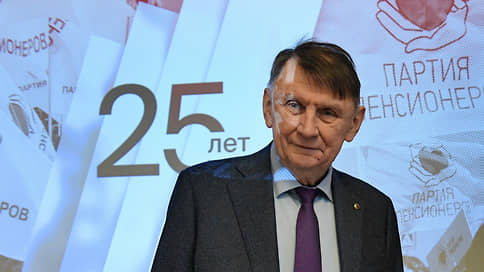Conservatism must be dynamic – Picture of the Day – Kommersant
[ad_1]

On Saturday, the Russian Party of Pensioners for Social Justice (RPPSS) held another scientific and practical conference dedicated to the formation of its own ideological concept – “dynamically developing conservatism.” For several years now, the RPPSS has been offering the state to adopt the experience of the older generation – for example, “the collectivist values of the Soviet era.” At the same time, the party calls itself the only political force with a science-based ideology, although this does not particularly affect its election results.
At a meeting of the Presidium of the Central Council of the RPPS, which took place on the eve of the conference, the “pensioners” discussed the party’s election strategy and the plan for the 2023 election campaigns. As Vladimir Vorozhtsov, deputy chairman of the central council, told Kommersant, the party members decided to focus their efforts on the elections of legislative assemblies in those regions where the RPPSS has a “parliamentary privilege”, that is, the right to nominate lists of candidates without collecting signatures. “We listened to the heads of regional organizations, and in April they will report on the work done,” Mr. Vorozhtsov noted. According to him, the “pensioners” have not yet made a decision to nominate lists of candidates for elections to the parliaments of new regions, but at the same time they delegated their representatives to the electoral commissions of the Donetsk and Luhansk People’s Republics.
Recall that on September 10 elections of deputies of legislative bodies will be held in sixteen “old” and four “new” subjects of the Russian Federation.
To participate in them without collecting signatures, a non-parliamentary party must have a faction in the outgoing convocation of the legislative assembly or a representative in any municipality of the region. At the moment, of those subjects where deputies will be elected in September, the RPPSS is guaranteed to have such a benefit in Khakassia, the Trans-Baikal Territory, Smolensk and Vladimir regions. In other regions, she will have to collect signatures of 0.5% of voters, which does not always end in success.
However, as the chairman of the central council of the RPPSS Vladimir Burakov stated during the scientific-practical conference, the Pensioners’ Party was created “not for political struggle, but to express and protect the interests of the unjustly disadvantaged.”
According to Mr. Burakov, sociological surveys conducted by the RPPSS show that 76% of Russian citizens are set for significant changes and are waiting for them, but at the same time, 86% declare “categorical rejection of new shocks like the collapse of the USSR.”
These expectations are precisely met by the concept of “dynamically developing conservatism” developed by the party, which “is aimed at the need for reform and maintaining positive continuity, but is not associated with dangerous and heavy destruction,” Mr. Burakov stated: “Changes are in demand in modern Russian society, but without revolutions and upheavals.
“Our ideology is based on the Confucian model, according to which a person receives a reward based on the results of his activity,” the party leader continued. “There is an opinion that the older a person is, the more he is for “leveling”. This is a big misconception. On the contrary, with age, a person wants to get what he deserves.
“Dynamically developing conservatism” implies not only social equality, regardless of belonging to the age group, but also borrowing the experience of the older generation.
For example, the RPPSS believes that older people are “the main bearer and custodian of high ideological and moral principles and patriotic consciousness”, since they managed to “partially preserve the collectivist values inherited from the Soviet era.”
It should be noted that the RPPSS has been promoting the concept of “dynamically developing conservatism” for several years, annually emphasizing that it is the only party that, on its own initiative, is developing a “project for the systemic and integrated development of the state.” True, this does not bring it closer to political success yet: in the elections to the State Duma in 2021, the Pensioners’ Party won 2.45% of the votes on party lists and did not enter the lower house.
[ad_2]
Source link








